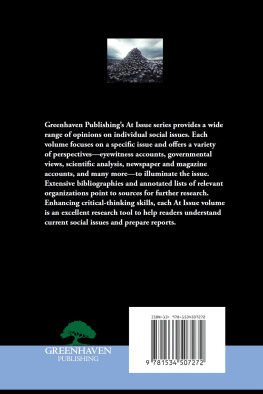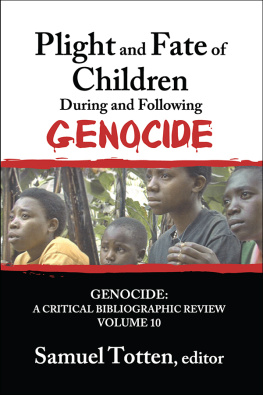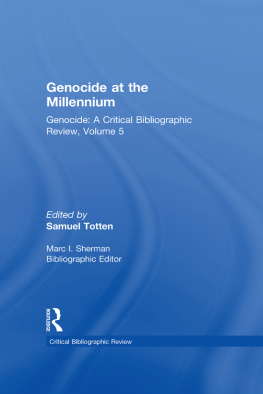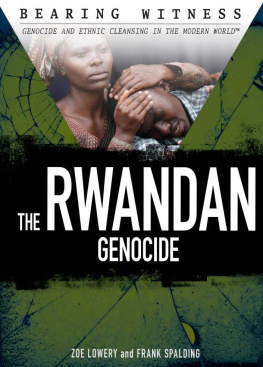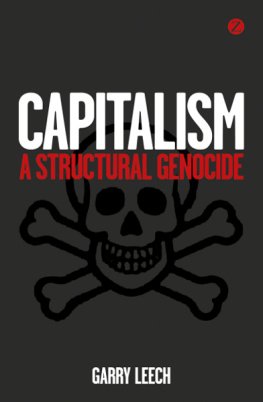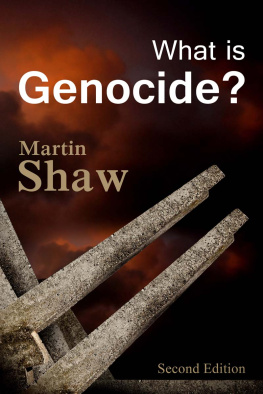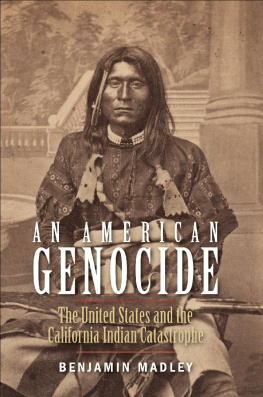University of Virginia Press
2015 by the Rector and Visitors of the University of Virginia
All rights reserved
Printed in the United States of America on acid-free paper
First published 2015
9 8 7 6 5 4 3 2 1
Library of Congress Cataloging-in-Publication Data
Campbell, Bradley Keith.
The geometry of genocide : a study in pure sociology / Bradley Campbell.
pages cm. (Studies in pure sociology)
Includes bibliographical references and index.
ISBN 978-0-8139-3741-0 (cloth : alk. paper) ISBN 978-0-8139-3742-7 (e-book)
1. Genocide. 2. Social control. I. Title.
HV6322.7.C336 2015
304.663dc23
2015019372
PREFACE
The American Civil War general William T. Sherman rightly said that war is hell. But if war is hell, what is genocide? War and genocide have similar horrorsblood, guts, and gore (Snyder 2014)but for most of us genocide seems worse. We might appreciate the virtues of the loyal soldier fighting for his country, even in an unjust war, but what of those whose enemies are children and civilians rather than other armed fighters? What of those who shoot unarmed people in the backs of their heads as they lie helplessly in ditches and then pile more victims on top of them? What of the gas chambers?
We see in genocide an evil so starkbeyond even the hellishness of warfarethat we may want to look away. As political scientist and genocide scholar Adam Jones notes, those of us who study genocide will often hear, after telling someone about our work, some version of Why would you want to study that? (2006:xviii). I have heard it, and I can sympathize. Why try to understand something like genocide? Why disturb ones mind with those images? But since you, the reader, have now opened up a book on genocide, maybe you find as I do that you do not wish to look awayor cannot. Maybe you believe that good will result from better knowledge of genocide. Maybe you sense that otherwise you would fail to understand something significant about reality.
So we try to explain genocide, but how? In the traditional formulation, evil comes from the world, the flesh, and the Devil. The theologian might study the Devil and the psychologist the flesh, but as a sociologist I study the worldhuman society. Examining genocide sociologically means identifying its social influences and the social context in which it occurs. Sociologists have various ways of doing this, though, and many are interested in the interactions between the social and psychological levels of reality. For example, they might examine how society shapes individuals. They might thus identify how culture, early childhood socialization, or some other societal feature motivates people to plan or participate in genocide. Another tack is to examine how individuals shape society. One way of doing this is to look at human behavior as resulting from individuals making the choices that most benefit themselves. Sociologists might thus show how the decision to engage in genocide benefits political actors in specific circumstances. We may learn a great deal from these and other approaches, but notice that each one focuses on some things and puts others to the side. Any coherent theory must do this, as does my own. The approach I use, called pure sociology, focuses exclusively on the social, leaving psychological and other individualistic factors out entirely.
I say more about pure sociology in chapter 1, but for now I simply ask you to keep an open mind. It might seem weird or even crazy to try to explain any behaviormuch less extreme evil like genocidewithout reference to the character or minds of those engaging in it. But I invite you to consider, even if you believe we must be losing something important by stripping away all but the social factors, that doing so might also reveal things about genocide that other approaches obscure.
Another thing that might seem weird or crazy is that I do not deal here with the morality of genocide. Genocide concerns usit concerns meprecisely because of our moral reaction to it. We want to better understand these events that shock our consciences and leave us so confused. Yet our judgments of genocide do little to help us explain it scientifically, so the evil of genocide is another aspect of it that I put to the side. I shall discuss the reasons for this in more detail, but for now consider that most of those planning and carrying out genocide have not set out to do evil. On the contrary, they see themselves as meting out justice, protecting their communities from danger, or otherwise engaging in morally upright behavior. For them genocide is a way which seemeth right (Proverbs 14:12). This is an idea we might resist. If people can in good conscience engage in great evil, how can we be confident we are not similarly mistaken about our own beliefs and behaviors? But we must face such matters squarely if we are to make progress in understanding them.
I am grateful to those of you, the readers, who are willing to look more closely with me at this difficult subject, and to look at it in an unfamiliar way. I am also grateful to all who have helped with this book, directly by reading drafts and giving advice and indirectly by shaping my intellectual development. My first exposure to sociology was as an undergraduate at Lee University, in an introductory course taught by Karen Mundy in the spring of 1993, when I was just seventeen years old. Sociologists were interested in the things I was interested in, it seemed, and a year later I changed my major from accounting to sociology, though I had little idea of what I might end up doing. Eventually I went to Clemson University for a masters, and I am grateful to William Wentworth, James Hawdon, and John Ryanthe members of my thesis committee therefor supporting me in various ways, including by prodding me to go to a Ph.D. program. Their help, along with that of Brenda Vander Mey, who employed me as a research assistant, was generous and efficacious.
I began my work on genocide in the sociology department at the University of Virginia, and I thank the members of my doctoral dissertation committeeDonald Black, Jeffrey Olick, Milton Vickerman, and outside readers Elizabeth Arkush and Roberta Senechal de la Rochefor all of their help. I especially thank Donald Black, my dissertation advisor, who has done more to shape this book than anyone else. I knew little of his work until the first day of his Sociology of Law seminar in the fall of 2000, my first semester at the University of Virginia. He began that day by writing on the board, Law varies directly with relational distance, and I was amazed to find out that this formulation applies cross-culturally and cross-historicallythat it can explain facts as seemingly unconnected as the absence of law in hunter-gather societies and the variability in the application of the death penalty in the modern United States. I have been hooked on pure sociology ever since. Since then he has helped me in countless ways throughout my career and on this project, including by giving detailed feedback first on my dissertation and later on two earlier drafts of this book.
Elsewhere I have encouraged sociologists to think more about their vocation and to treat their work with moral seriousness (Campbell 2014a:451; 2014b:7). I know of no sociologist who does so more than Donald Black. He is an exemplar of vocational integrityan idealist fearlessly and joyfully pursuing the scientific study of social life. And it is infectious. After nearly every conversation with him, I come away resolved to be a better sociologist.


